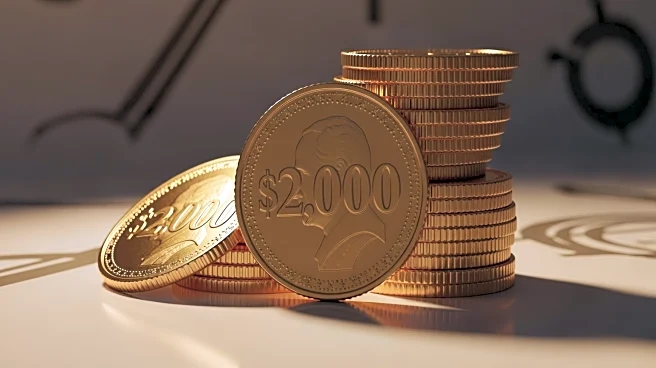What's Happening?
President Trump has suggested the idea of issuing $2,000 tariff rebate checks to American families, similar to the stimulus payments distributed during the Covid-19 pandemic. This proposal was shared via
Truth Social posts, where Trump mentioned the possibility of a tariff 'dividend' aimed at providing financial relief to families. Despite the announcement, Treasury Secretary Scott Bessent stated that no formal discussions or proposals have been made regarding this initiative. Economists have expressed concerns that such direct payments could exacerbate inflation, which has been a persistent issue since the introduction of widespread tariffs earlier this year. The current tariff policies are estimated to cost each household $1,800 on average in 2025, according to a Yale Budget Lab analysis.
Why It's Important?
The proposal for tariff rebate checks comes at a time when American families are facing financial pressures from rising health-care costs and tariffs. The potential for direct payments could provide immediate relief to households, but it also poses risks of increasing inflation. The pandemic-era fiscal stimulus previously contributed to a significant rise in inflation, and similar measures could lead to further economic instability. The idea of rebate checks is politically charged, with potential implications for the upcoming midterm elections. Congressional approval would be necessary for such a policy to be enacted, and the current partisan climate may pose challenges to its implementation.
What's Next?
If the political landscape shifts, there could be increased interest in pursuing the rebate checks as a policy measure. However, economists warn that any direct payments could lead to inflationary pressures, complicating the economic recovery. The proposal remains speculative, with no concrete plans or legislative support at this time. The Senate Committee on Finance is currently reviewing related legislation, but its future is uncertain. Stakeholders, including businesses and consumers, will be closely monitoring developments as they navigate the economic impacts of tariffs and potential rebate checks.
Beyond the Headlines
The proposal raises questions about the long-term economic strategy of the Trump administration, particularly regarding tariffs and their impact on consumer prices. The idea of using tariff revenue for direct payments challenges traditional views on trade policy and its role in domestic economic relief. Additionally, the proposal highlights the ongoing debate over fiscal policy and its effectiveness in addressing economic disparities. The potential for increased inflation underscores the complexity of balancing immediate financial relief with sustainable economic growth.










